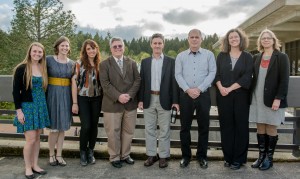The Rachel Carson Forum is one of the oldest traditions of Evergreen’s Graduate Program on the Environment offering the Masters of Environmental Studies (MES) degree, now approaching its 30-year anniversary. The event was established in 1990 as a tribute to Rachel Carson, a marine biologist and writer in a time when it was almost impossible for women to pursue careers as scientists. While Carson wrote several well-known books, such as The Sea Around Us and Our Ever Changing Shore, her legacy is largely tied to her groundbreaking book, Silent Spring. While the science of the environmental and human effects of pesticide application was outside her area of expertise, the book’s bold and impassioned arguments started inspired conversation and debate that helped spark the environmental movement of the 1960s.
The Rachel Carson Forum has always been organized by students of Evergreen’s MES Program. The current organizing group, the Masters of Environmental Studies Student Association (MESA), put together the 2014 panel featuring two amazing Evergreen alumni, Rhys Roth ’90, an MES graduate and Director of the Evergreen Center for Sustainable Infrastructure, and Thera Black ‘92, Senior Planner for the Thurston Regional Planning Council (TRPC). The panel also featured Richard Fealy, Senior Scientist for the National Oceanic and Atmospheric Administration (NOAA) and Nobel Prize recipient, and Andy Haub, Planning and Engineering Manager for the City of Olympia. Such an incredible group of guest speakers has come to be expected of the Rachel Carson Forum; the event has featured true giants of the environmental community, such as the late Billy Frank Jr. and mycology pioneer Paul Stamets ’80, in recent years.
Martha Henderson, Director of the MES Program, started the conversation on April 24 by recounting the lasting legacy of Rachel Carson in helping convey and rally people to complex environmental issues through strong science and communication. The panel members perfectly exemplified that mission, and the mission of the Rachel Carson Forum’s founding faculty, who Henderson conveyed, “wanted to provide images of environmental action.” Henderson emphasized that the event wasn’t just for students, but that is was “a service of MES to the broader community.”
MES leadership has always represented that philosophy, including the likes of Oscar Soule, Ralph Murphy, John Perkins, Tom Rainey, Richard Cellarius, and now Martha Henderson. Henderson’s term as director will end in late August, when she will return to teaching full time; she will take a group of students to the eastern Mediterranean region in Spring 2015. In talking about the MES Program, Henderson recalled it traditionally as a home for “Environmental Refugees” from across the country. While today’s graduate students have many schools where they may pursue a Masters in Environmental Studies degree, Evergreen’s MES program has adapted to changing times. It has three prongs of study: Climate and Energy Studies, Ecology, and Community Sustainability. Approximately 70% of the program’s students are women, an important focus of Henderson’s work as MES Director. Another important issue is global climate change, which Henderson believes will inform a shift in the focus of MES to “to help us understand alternative ways to have constructive relationships with the environment.”
Hopefully, the Rachel Carson Forum can help students, and the broader community, do just that, for the next 30 years and beyond.


